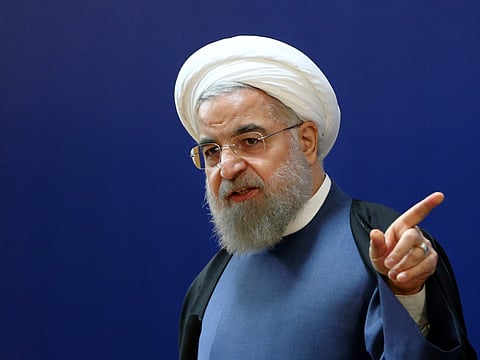Benefitting more from a moderate Iran
The GCC seeks not investment opportunities from Tehran, but security and stability

Millions in Iran are reported to be happy to see some $50 billion (Dh183.9 billion) of Iranian assets released after international sanctions were partially lifted last month. They were elated that their country had finally signed the Vienna agreement and recognised that the nuclear-armed programme, no matter how nationally prestigious, was economically and politically costly.
Those happy Iranians have a rare chance later this month to translate their jubilance into a concrete step when they will vote to elect two important bodies: The parliament and the Assembly of Experts. They have a once-in-a-lifetime opportunity to change a revolutionary Iran into a normal state that lives in peace with its immediate neighbours on the other side of the Gulf.
Saudi Arabia, the UAE and the other Arab Gulf states have come to terms with the Vienna nuclear accord of July, 2015. However, although Riyadh, Abu Dhabi and the other Gulf capitals officially welcomed the agreement, they believe Iran’s desire to dominate in the region and act as a policeman in the Gulf continues to underpin its policies. They will be the first to welcome a different Iran, one that is denuclearised, de-revolutionised and, if possible, eventually de-sectarianised.
The net beneficiary of a different Iran would not be far-off counties in the West and East, who are now desperately falling over Iran because of its potential investment opportunities, but the Gulf Cooperation Council states who know from close encounter how difficult post-1979 Iran has been. They search not for investment opportunities but for security and stability and a good neighbourly relationship to complement existing commercial and social ties that are deeply rooted in history and inherently linked to their geographical proximity.
Opening up
Indeed, a moderate Iran is music to their ears, more so than any other state in the world. They have been missing this supposedly decent Iran for the past three decades. A normal state and a non-aggressive Iran is all that its Arab Gulf neighbours ask for.
Unfortunately, Iran’s immediate neighbours do not see a different Iran evolving any time soon because President Hassan Rouhani’s government decided out of pure necessity to sign the nuclear deal or because United States President Barack Obama, for pure personal legacy, wanted to open up to Iran.
Iran’s Supreme Leader Ayatollah Ali Khamenei still calls the US names, the Revolutionary Guard is in no mood to give up its tight control of society and conservative forces are lethargic about hints of moderate Iran. They are in the driver’s seat, not the millions of happy Iranians who are badly affected by twenty years of economic sanctions and who have had enough after three decades of revolutionary thought.
That is why from the Arab Gulf perspective Iran will remain difficult for the time being. They do not see any credible indication that the country is going to change any time soon or ever.
Iran has always been a difficult neighbour to people on the other side of the Gulf. The post-1979 Iran has been a particularly difficult neighbour than at any other time in recent history. The 2003 American invasion of Iraq has emboldened Iran multiple times over, and made it act more arrogantly.
After years of tedious negotiation the West thinks that it has finally managed to bring the nuclear Iran under control, but the million dollar question now is, who is going to bring sectarian Iran under control?
Just as Iran was responsible for the ‘nuclearising’ Gulf security, it is solely responsible for sectarianising regional politics. It is finding the Shiite communities in Iraq and throughout the region as the new reliable power base to penetrate Arab politics and enhance its regional dominance.
Sectarian Iran does not seem to be a major concern to the international community but it is on the top security challenge for Arab Gulf capitals. This is primarily because Iran treats its Shiite citizens as its natural satellite, which makes the nation unbearably interventionist and confirms the view of Iran as a dangerously destabilising force. Its latest state budget allows for a 15 per cent-plus increase in funds for the Islamic Revolutionary Guards Corps, which runs the Quds Force that is responsible for overseas operations.
This confirms the Arab Gulf states’ fear that money badly needed to revitalise Iran’s sanctions-hobbled economy will instead end up in the hands of Lebanon’s Hezbollah movement, Yemen’s Al Houthis’ insurgency and Iraq’s Shiite militias.
So if millions of Iranians are truly happy to see the sanctions lifted, they need to show it through deeds and to show it now not in the distant future. The millions of people on the other side of the Gulf urge them to make Iran less sectarian, less difficult and less arrogant.
The message from the other side of the Gulf to the decent people of Iran is: Let us join hands to make the Gulf a good neighbourly zone. Iran will probably never find better peace-loving neighbours than the six Arab Gulf states.
Dr Abdulkhaleq Abdulla is professor of Political Science and chairman of the Arab Council for Social Sciences, theacss.org. You can follow him on Twitter at twitter.com/Abdulkhaleq_UAE.


